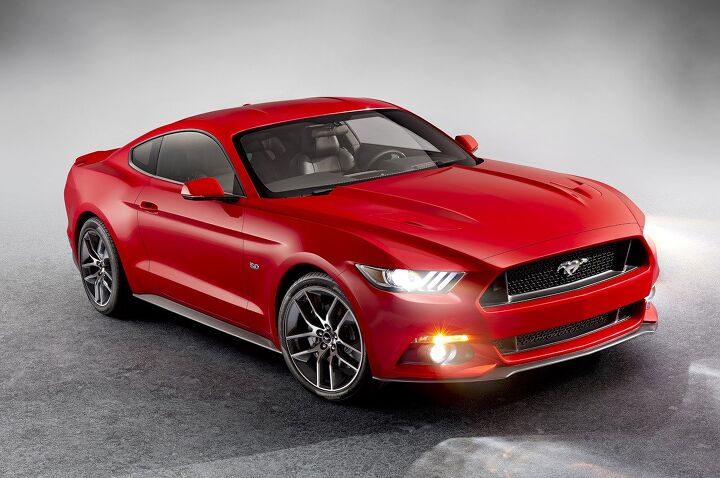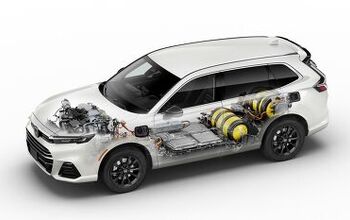U.S. Ford Mustang Sales Boom In March 2015: Mustang Outsells Lincoln; Outsells Camaro And Challenger Combined
The Ford Mustang outsold the whole Lincoln brand by a 1.5-to-1 count in March. U.S. Mustang volume has, not surprisingly, risen sharply since the age of the sixth-generation model began.
March’s tally, however, was particularly notable, not just because of the way in which Mustang volume made Lincoln’s abysmal total appear even worse (Lincoln sales slid 3%, year-over-year, to just 8695 units) but because the Mustang outsold the Chevrolet Camaro and Dodge Challenger, combined.
That won’t become a long-term trend. General Motors is already gradually leaking details of its next Camaro. The Challenger, meanwhile, is selling better than ever. Sales have only increased on an annual basis since Dodge brought the nameplate back in 2008.
Nevertheless, the Mustang’s March total of 12,663 U.S. sales was, according to Ford, the “best performance in eight years.”
More precisely, Mustang volume hasn’t been this healthy on a monthly basis since June 2007.
CarMarch 2015March2014% Change3 mos. 20153 mos. 2014% ChangeFord Mustang12,6639,30536.1%29,81119,59652.1%Dodge Challenger6,1104,88225.2%15,95711,03444.6%Chevrolet Camaro5,9568,624-30.9%17,32019,568-11.5%—— —————Total24,72922,811 8.4% 63,08850,19825.7%Remember the summer of oh-seven? Yeah, Bush was president, Craig Biggio was still playing baseball, and you were singing all the words to Umbrella in a rented Caliber. More importantly, the Camaro hadn’t returned from its lengthy hiatus, and the Challenger was still months away from being available for order.
In that era, 12,781 Mustang sales wasn’t all that impressive. Ford averaged nearly 14,000 monthly Mustang sales in the United States the year before.
But in 2015, when the overall passenger car market isn’t quite as large and in decline, when competitors of various types are attempting to steal sales, when most other Ford cars posting decreased volume, the Mustang’s surge to 12,663 March sales is rather impressive.
The Mustang was America’s 18th-best-selling car in March 2015 and finished the month just 68 sales back of the 17th-ranked Kia Soul. Besting vehicles like the Subaru Outback and Volkswagen Jetta, the Mustang accounted for 17% of Ford brand car sales, significantly more than the Taurus, Taurus Police Interceptor, Fiesta, and C-Max combined.
Timothy Cain is the founder of GoodCarBadCar.net, which obsesses over the free and frequent publication of U.S. and Canadian auto sales figures. Challenger year-to-date figures updated, intiially published with Charger Q1 figures.
More by Timothy Cain
Latest Car Reviews
Read moreLatest Product Reviews
Read moreRecent Comments
- W Conrad I'm not afraid of them, but they aren't needed for everyone or everywhere. Long haul and highway driving sure, but in the city, nope.
- Jalop1991 In a manner similar to PHEV being the correct answer, I declare RPVs to be the correct answer here.We're doing it with certain aircraft; why not with cars on the ground, using hardware and tools like Telsa's "FSD" or GM's "SuperCruise" as the base?Take the local Uber driver out of the car, and put him in a professional centralized environment from where he drives me around. The system and the individual car can have awareness as well as gates, but he's responsible for the driving.Put the tech into my car, and let me buy it as needed. I need someone else to drive me home; hit the button and voila, I've hired a driver for the moment. I don't want to drive 11 hours to my vacation spot; hire the remote pilot for that. When I get there, I have my car and he's still at his normal location, piloting cars for other people.The system would allow for driver rest period, like what's required for truckers, so I might end up with multiple people driving me to the coast. I don't care. And they don't have to be physically with me, therefore they can be way cheaper.Charge taxi-type per-mile rates. For long drives, offer per-trip rates. Offer subscriptions, including miles/hours. Whatever.(And for grins, dress the remote pilots all as Johnnie.)Start this out with big rigs. Take the trucker away from the long haul driving, and let him be there for emergencies and the short haul parts of the trip.And in a manner similar to PHEVs being discredited, I fully expect to be razzed for this brilliant idea (not unlike how Alan Kay wasn't recognized until many many years later for his Dynabook vision).
- B-BodyBuick84 Not afraid of AV's as I highly doubt they will ever be %100 viable for our roads. Stop-and-go downtown city or rush hour highway traffic? I can see that, but otherwise there's simply too many variables. Bad weather conditions, faded road lines or markings, reflective surfaces with glare, etc. There's also the issue of cultural norms. About a decade ago there was actually an online test called 'The Morality Machine' one could do online where you were in control of an AV and choose what action to take when a crash was inevitable. I think something like 2.5 million people across the world participated? For example, do you hit and most likely kill the elderly couple strolling across the crosswalk or crash the vehicle into a cement barrier and almost certainly cause the death of the vehicle occupants? What if it's a parent and child? In N. America 98% of people choose to hit the elderly couple and save themselves while in Asia, the exact opposite happened where 98% choose to hit the parent and child. Why? Cultural differences. Asia puts a lot of emphasis on respecting their elderly while N. America has a culture of 'save/ protect the children'. Are these AV's going to respect that culture? Is a VW Jetta or Buick Envision AV going to have different programming depending on whether it's sold in Canada or Taiwan? how's that going to effect legislation and legal battles when a crash inevitibly does happen? These are the true barriers to mass AV adoption, and in the 10 years since that test came out, there has been zero answers or progress on this matter. So no, I'm not afraid of AV's simply because with the exception of a few specific situations, most avenues are going to prove to be a dead-end for automakers.
- Mike Bradley Autonomous cars were developed in Silicon Valley. For new products there, the standard business plan is to put a barely-functioning product on the market right away and wait for the early-adopter customers to find the flaws. That's exactly what's happened. Detroit's plan is pretty much the opposite, but Detroit isn't developing this product. That's why dealers, for instance, haven't been trained in the cars.
- Dartman https://apnews.com/article/artificial-intelligence-fighter-jets-air-force-6a1100c96a73ca9b7f41cbd6a2753fdaAutonomous/Ai is here now. The question is implementation and acceptance.


































Comments
Join the conversation
Now if Ford were to make a luxurious, stretched Mercury Cougar version of the Mustang and sell it as a Lincoln, then the Lincoln brand could start to post some decent numbers. (But what to call it? "Cougar" is our target market segment! Maybe the... Lincoln Milf?)
It's great to see Ford actually get one of it's new vehicle right. Ford is almost there in making a vehicle as attractive as a EU performance car. The Mustang will sell well in Australia with the V8. Now all Ford needs to do is introduce the global Ranger in the US, get rid of that pathetic Explorer and put the Everest (renamed as an Explorer) in it's place.